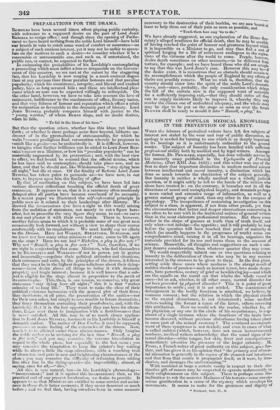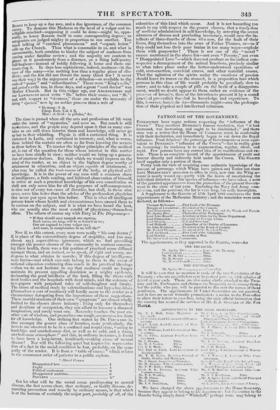NECESSITY OF POPULAR MEDICAL KNOWLEDGE IN THE PREVENTION OF INSANITY.
WHEN the labours of periodical writers have left few subjects of interest not staled by the wear and tear of public discussion, no
apology is needed for turning to one which is as deeply important
ill its bearings as it is unfortunately unfamiliar to the general reader. The subject of Insanity has been handled with sufficient professional ability both by medical and by legal writers. Amongst the former, Dr. PRICHARD, especially, has done valuable service by his masterly essay published in the Cyclopedia of Practical Medicine, (Part XIII. Jan. 1833) ; and this writer was one of the first to draw that important distinction in modern medical science betWeen intellectual and moral insanity, a distinction which has done so much towards the elucidation of the subject generally. But insanity is neither a wholly medical nor a wholly judicial question, or it might safely be left to the hands of the writers who alone have treated it : on the contrary, it branches out in all the directions of moral and metaphysical inquiry, and demands perhaps a more varied and extensive range of information, as well as a greater natural grasp of mind, than any other in the compass of physiology. The inexpedience of restraining investigation on this subject to a class, is apparent, if not from other proofs, yet from the circumstance that better and deeper observations concerning it are often to be met with in the incidental notices of general writers than in the most elaborate professional treatises. But these come rather in the shape of guesses at truth than of truth itself; and only whet—not indulge—the appetite ; and it will probably be long betbre the question will have reached that point of maturity at which (as usually happens in the progresses of truth) some one comprehensive mind, seizing it in all its bearings, organizes the materials provided for its use and turns them to the account of science. Meanwhile, all thoughts and suggestions on such a sub- ject deserve consideration, from whatever quarter they may come. We would respectfully submit one or two questions relating to insanity to the deliberation of those who may be in any manner interested in the answers to be given to them. In the first place, setting aside those cases where madness is the abrupt result of sudden shocks of passion—such as instant terror, love made despe- rate, hate powerless, ecstacy of grief or bewildering joy—and which are the squalls on the moral sea that whelm the whole vessel at once—let us ask, whether, in all other cases, mental disorder has not been preceded by physical disorder ? This is a point of great importance to settle ; and it is not settled. The coexistence of derangement in the bodily functions is admitted, we believe, by common consent ; but the relation in which the physical stands to the mental disturbance, is not determined ; some medical writers making the former a cause of the latter, others reversing this attribution. Now we would ask the reader, whether Ime, or his physician, or any one in the circle of his acquaintance, is cog- nizant of a single instance where time functions of the brain have become diseased, without previous disturbance having taken place in some part of the animal economy ? The continual accompani- ment of these symptoms is not denied; and even in cases of what is called sudden (which, however, does not mean instantaneous) madness, medical writers acknowledge that the usual signs of In- ternal disorder—white tongue, hot skin, fever and constipation— immediately advertise the presence of the larger calamity. M. Prim, a French writer of great authority on this subject, goes fur- ther, and has given it as his opinion that "the primary seat ofmcn- tal alienation is generally in the region of the stomach and intestines; and that from that centre it propagates itself; as it were, by irra- diation, and deranges the understanding." With mankind at large a certain vanity in respect to their dis- tinctive gift of reason may be suspected to operate unfavourably to their enlightenment on this subject. There is perhaps some dis- inclination to rob the monster Madness of his terrors—sonic uncon- scious gratification in a sense of the mystery which envelops his movements. It seems to make for the greatness and dignity of
* Prichard, Sect. II., 6.
Reason to keep up a due awe, and a due ignorance, of the common e„engs To demean this Madness to the level of a vulgar and in- telligible mischief—supposing it could be done—might be, appa- rently, to lower Reason itself in some corresponding degree ; as antagonists are judged mighty in proportion to one another. Too much talking of " cerebral phoenomena " and "organic lesion " calls up the Church. Thus what is reasonable in us, and what is unreasonable, both combine to hinder the subject of madness from coming under familiar review ; and the majority arc content to lance at it passionately from a distance, as a thing half-poetry half-bugbear—instead of boldly following it home and there en- countering it. In days less sophisticate, indeed, madness—in the eyes of the many—was nothing less than a regular piece of dia. blerie • and the few did not thwart the many (kind few ! it never was their way) in the enjoyment of a delusion—so available to the ends of " peace " and " subordination." There were " King's evils," and priest's evils too, in those days, and a great "mad doctor" was Mother Church. But in this vulgar age, our ABERNETHIES and our LAwRENCES must write "Dr." before their names, not " St."; and, with respect to "daimons.," these are under the necessity of being " ejected" now by no nobler process than a writ of " Hvdrarg: 6 9, amp. Extr. Col. 3 3, i‘Iisc: et lurid : in Oinks," &c.
The time is passed when all the arts and professions of life went under the name of "mysteries," and were so. But much is still myiterious, and the people may depend upon it that as many cur- tains as are still down betwixt them and knowledge, will never go ap but to their whistling. Physic is still a curtained thing. It is curtained in Latin, and curtained in interest ; and, what is worse, those behind the curtain are often as far from knowing the secrets as those before it. To master the higher principles of the medical art, is out of the question for those whose interest in this matter we have here chiefly in view ; neither would we bring up a genera- tion of amateur doctors. But that which we would impress on the mind of the reader, as an object in the highest degree worthy of attainment in education, and an object capable of attainment, is what may be called the mai seasroy of the body, or physical self- knowledge. It is in the power of any man with a common share of intelligence, a little reading, and habitual observation of himself, to arrive at such a practical knowledge of his own constitution as shall not only serve him for all the purposes of self-management, in nine out of every ten cases of disorder, but shall, in those nine cases, serve him better than the advice of the profoundest physician that never put eyes upon him before. This is what all intelligent persons know whose health and circumstances have caused them to be curious on the subject, and it is what we have heard the best, who are usually also the most candid of physicians,. themselves affirm. The others of course say with Envy in The Dispensary- " If they should once unmask our mystery,
Each nurse, ere long, will be as leaned as we; Our art exposed to every vulgar eye; And none, in complaisance to us, will the!"
Now if, to this extent, every man were really " his own doctor ;" if, in place of the extraordinary degree of stupidity, and (we may almost say) superstitious ignorance, which we find prevailing amongst the poorer classes of the community in matters concern- ing their health, there was a fair portion of practical sense diffused amongst them, and an instinct, so to speak, of right and wrong; an- alogous to what obtains in morals ; if this degree of intelligence were theirs—and which can only belong to them in the event of national education embracing thus much in its practical blessings —then we do not hesitate to say that madness could no longer maintain its present appalling dominion as a mighty epidemic, decimating the good intellects of the land, filling the rivers with dead bodies and the hospitals with dead minds, and the columns of newspapers with perpetual tales of self-slaughter and fhtuity. The abuse of medical study by valetudinarians and hypechondriacs, (themselves a sort of madmen) will hardly occur to the reader as a' circumstance derogating from the importance of these suggestions. These morbid students of their own " symptoms " are almost wholly limited to the classes above industry : living only for themselves and destitute of occupation, they can afford to humour a diseased imagination, and rarely want one. Necessity teaches the poor an- other sort of wisdom, and prescribes one rough, common-sense forin for all knowledge. One striking fact stated by Dr. Pim-m.4Rn is, that amongst the poorer class of lunatics, more particularly, the bowels are observed to be in a confined and torpid state, "owing to hardships and unwholesome diet, as well as to cold, and a damp, unwholesome atmosphere :" and this, in ordinary instances, is found to have been a long-latent, insidiously-working cause of mental disease! Nor will the following quiet but impressive representa- tion of a flict in the social condition be lost, probably, on the sym- pathy of the reader. It is from a "table of causes " which relates to the commoner order of patients in a public asylum.
" AThral Causes.
Disappointed love Fright 4
Political excitement
Disappointed ambition 0
POVERTY
But let what will be the moral cause predisposing to mental disease, the fact seems clear, that ordinary, or bodily disease, de- manding prevention and remedy by ordinary means, is that which is at the bottom of certainly the major part, probably qf all, of the calamities of this kind which occur. And it is not hazarding too much to say with respect to the poorer classes, that a timely dose of medicine administered in self-knowledge, by arresting the secret advances of disease and precluding inveteracy, would save the in- tellects of three-fourths of those who now, for the fault of their livers, fling themselves into the arms of Father Thames, or—as if they could not lose their poor brains in too many ways—explode them with gunpowder! There is not one of the " moral " causes mentioned in the above list—not even " Poverty," not even " Disappointed Love "—which does not produce as its earliest con- sequence a derangement of the animal functions, precisely similar to what takes place under the better-understood operations of cold, over-exertion, convivial excess, and other material causes. That the agitation of the spirits under the emotions of passion should leave its traces on the stomach, is a proposition into which persons in this class of life would probably be peculiarly slow to enter ; and to take a couple of pills on the heels of a disappoint- ment, would no doubt appear to them rather an evidence of the presence of insanity, than of the intention to prevent it by a sound practical proceeding founded in knowledge and experience. To this, however, hundreds do—thousands might—owe the prolonga- tion of their physical and intellectual existence.



























 Previous page
Previous page